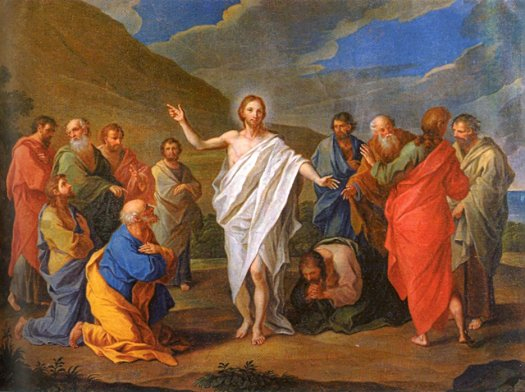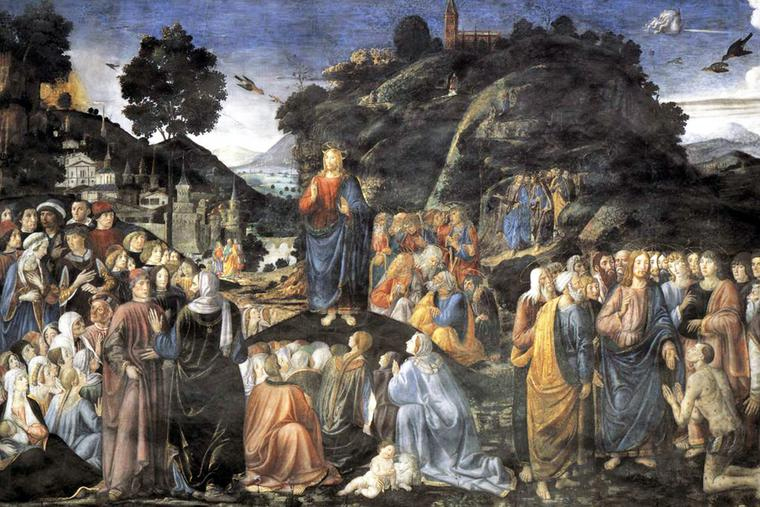Christian Art | Jesus Teaches His Disciples | Discourse Of The Mission
Matthew 10: 24-33 – Week 14 Ordinary Time, Saturday (King James Audio Bible KJV, Spoken Word)
24 The disciple is not above his master, nor the servant above his lord.
25 It is enough for the disciple that he be as his master, and the servant as his lord. If they have called the master of the house Beelzebub, how much more shall they call them of his household?
26 Fear them not therefore: for there is nothing covered, that shall not be revealed; and hid, that shall not be known.
27 What I tell you in darkness, that speak ye in light: and what ye hear in the ear, that preach ye upon the housetops.
28 And fear not them which kill the body, but are not able to kill the soul: but rather fear him which is able to destroy both soul and body in hell.
29 Are not two sparrows sold for a farthing? and one of them shall not fall on the ground without your Father.
30 But the very hairs of your head are all numbered.
31 Fear ye not therefore, ye are of more value than many sparrows.
32 Whosoever therefore shall confess me before men, him will I confess also before my Father which is in heaven.
33 But whosoever shall deny me before men, him will I also deny before my Father which is in heaven.
No matter how great the world’s lies may be, we are assured by Jesus, truth will triumph. For this reason, these verses of the Gospel of Matthew teach us, we need not be afraid, though the going can get very rough indeed, and our Christian faith will be tested, our love always coerced to turn into the opposite of love, and so we need always the more love to counter this threat.
It is all we can do to imitate Jesus. This is the absolute most we can even aim for. Of course, we shall not succeed in so doing. We cannot. But this is not to invalidate the aim of moving closer and closer to a true imitation of Jesus Christ, and so ultimately, in this life and the next, submerging our identities in Jesus as his holy Church.
People have reviled Jesus, especially the religious leaders of the people of Israel. They have seen the saving miracles, and rejected the evidence of their own senses, never mind their hearts, because they were committed to an evil path. This was the case for Jesus, it was to be the case for the apostles, and we find now commitment to evil extends to our own time.
In our time, proclamations of love, inclusion, acceptance, even mere tolerance – never mind celebration – are often met with accusations that such is the work of Satan. Through this, we must derive new courage to read the Gospels through and through in Christian prayer, and with such care and sensitivity to discern the full truth of our Lord’s intentions.
Today’s Gospel verses emphasize the spiritual mission of the disciples – the supernatural mission – as the people of Israel are called from worldly things to – reality. To those who are committed to evil, it is a harsh light, exposing evil in a painful manner. But there is such joy to those who welcome the light of Jesus. Now there is no fear. Reality has come – the Kingdom. Through all that we do which is truly Christian, we can proclaim this reality from the rooftops, Satan be damned. Love wins, which is to say God wins, every time.
Concluding Prayer
Lord God,
living light of eternal love,
grant that always aglow with charity,
we may love you above all else
and our brethren for your sake,
with one and the selfsame love.
Through Christ our Lord.
![]()
King James Audio Bible | Endnotes
That Which I Have Told You In Darkness
Darkness is a sign of ignorance, sin, and spiritual blindness, representing lack of knowledge or understanding and the need for enlightenment and revelation. Darkness is also the way of the Cross toward salvation. Darkness is necessary.
When Jesus reveals to his disciples ‘in darkness’, Jesus is emphasizing the importance of receiving divine guidance and direction, and not relying on human wisdom. Indeed, in darkness, human wisdom might be considered to be fruitfully absent.
Darkness can indicate secrecy and concealment, with the knowledge that Jesus reveals being reserved for those who are close to him and have been entrusted with his message. This highlights importance of intimate relationship with Jesus and being willing to receive the knowledge and direction Jesus gives.
Furthermore, darkness represents hidden and mysterious aspects of God’s plan, and the importance of seeking out and carefully discerning divine revelation. The fact that Jesus meets his disciples ‘in darkness’ signifies that Jesus meets his disciples in their fear and uncertainty and provide guidance to carry out his mission.
In Catholic and Protestant theology, the thought of darkness has been interpreted. Saint Augustine believed that the darkness referred to the mystery of the Trinity and the hidden nature of divine revelation. Saint Augustine suggested that ‘the things which God reveals to us in this life are seen obscurely and in shadows, as in a glass darkly, but when we shall have come to see Him face to face, then that which is in part shall be done away’.
Protestant reformer John Calvin understood the darkness as referring to the Cross and the suffering that believers must endure for the sake of Christ. John Calvin believed that the revelation in darkness represented the hidden and mysterious nature of the Gospel, which must be proclaimed boldly even in the midst of opposition and persecution.
Dietrich Bonhoeffer, German Lutheran pastor and theologian, wrote on the idea of ‘costly discipleship’, emphasizing the importance of following Jesus even in the face of persecution and suffering.
Bonhoeffer saw the use of darkness in Matthew 10: 24-33 as a metaphor for the darkness of the world and the need for believers to shine the light of Christ in the midst of that darkness. He wrote: ‘Jesus Christ is the light of the world, who came to pierce through the darkness of sin and death. He calls us to be his witnesses in a world that lies in darkness.’








